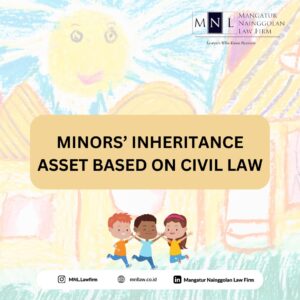
In Indonesia, inheritance law is pluralistic, with at least three types of inheritance laws still in effect and practiced in society, namely:
- Inheritance law based on Islamic Sharia governed by the Compilation of Islamic Law (KHI).
- Customary inheritance law, which varies greatly in its circumstances.
- Inheritance law based on the Civil Code (KUHPerdata). The diversity of these legal configurations will certainly have further consequences. Heirs may be faced with (at least) three juridical choices. However, each of these inheritance law systems has fundamental differences regarding the reasons for receiving inheritance, the order of heirs, and the share of heirs.
This article will discuss inheritance division based on the Civil Code. Inheritance Law in the Civil Code adopts an individual system, where the assets of the deceased estate are divided. This rule applies to Indonesian citizens of foreign descent such as Europeans, Chinese, and even Arabs who no longer strictly adhere to their religious teachings.
Based on the Civil Code, there are 4 categories of heirs, that is:
- Category I: the surviving spouse and children or descendants of the deceased who lived the longest.
- Category II: parents and siblings of the deceased.
- Category III: relatives in the direct line upwards after the parents of the deceased.
- Category IV: uncles and aunts of the deceased, both from the mother’s and father’s side, descendants of uncles and aunts up to the sixth degree counted from the deceased, siblings of grandparents and their descendants up to the sixth degree counted from the deceased.
Furthermore, referring to Article 875 of the Civil Code, the deceased can also distribute their inheritance assets through a will.
In practice, many cases are found where inheritance falls to underage children. Such situations are often confusing because underage children have limitations in legal actions. The age limit for minors varies significantly. Referring to Article 330 of the Civil Code, a person who is not yet an adult is one who is under 21 years of age and unmarried, whereas according to the Temporary Article, to perform legal actions, especially in the management of inheritance assets, one must refer to Article 1320 of the Civil Code, namely:
- Consent;
- Capacity;
- A lawful cause;
- A specific matter.
However, for minors who wish to manage inheritance assets but do not meet the competence requirement, they require a guardian to represent them.
Parents As Guardians of Minors
Due to a minor is unable to manage inheritance assets, a guardianship application can be made in accordance with Law Number 1 of 1974 concerning Marriage (“UU 1/1974”). Pursuant to Article 47 of UU 1/1974, the guardian for a minor child is their parents as long as their authority to represent the child has not been revoked, thus, normatively, parents automatically become the guardians of their children.
However, in practice, the application for the appointment of biological parents as guardians based on a court decision is a necessity because civil law requires written evidence confirming that the parents are the guardians of their children. Biological parents who will apply for guardianship to the court must prepare the following documents:
- A written guardianship application;
- Applicant’s ID card;
- Child’s birth certificate;
- Family card;
- Marriage certificate;
- Death certificate (if one of the parents has passed away);
- Other documents related to the child’s inheritance.
Guardians from the Minors’ Family or Legal Entity
Article 33 of Law Number 35 of 2014 concerning Child Protection (“UU 35/2014”) stipulates that if parents are unable to fulfil their obligations and responsibilities, an individual or legal entity that meets the requirements may be appointed as the guardian of the respective child. According to Article 51 paragraph (1) of Law 1/1974, the guardian is appointed by the parent who exercised parental authority before their death through a will or orally in the presence of 2 witnesses from the child’s family or other mature individuals who are of sound mind, fair, honest, and of good behaviour. Additionally, based on Article 33 paragraph (3) of UU 35/2014, the appointed guardian must at the same religion as the child.
Referring to Government Regulation Number 29 of 2019 concerning Procedures for the Appointment of Guardians (“PP 29/2019”), the family members appointed as guardians must meet the following requirements:
- Indonesian citizens permanently residing in Indonesia;
- At least 30 years of age;
- Physically and mentally healthy;
- Good behaviour;
- Economically capable;
- Of the same religion as the child;
- Obtaining written consent from the spouse if married;
- Willing to become a guardian as stated in a declaration;
- Making a written statement never to:
– Commit violence, exploitation, abandonment, or mistreatment against the child, or;
– Apply physical punishment for any reason, including disciplinary action against the child;
– Prioritize the child’s closest-degree family, and;
– Obtain consent from the parents if they still exist, are known to be present, and are legally competent.
Additionally, the appointed guardian must attach a recommendation from the local government social affairs office when undergoing the court appointment process.
Article 7 paragraph (1) of PP 29/2019 states that legal entities that can be appointed as guardians consist of technical implementation units of Ministries/agencies, technical implementation units of regional apparatus, and child social welfare institutions.
Thus, guardians of minors can manage inheritance assets, including selling and/or transferring them to third parties for the benefit of the child.
If you need legal consultation about any legal case, you can contact us through:
Email: secretary@mnllaw.co.id
Call: +62 21-3905928
